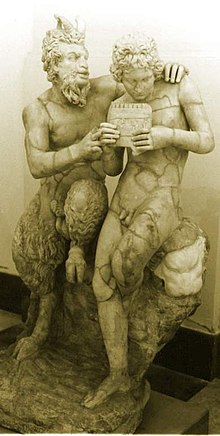Pan (god)
| Pan | |
|---|---|
| God of nature, the wild, shepherds, flocks, goats, of mountain wilds, and is often associated with sexuality | |

|
|
| Abode | Arcadia |
| Symbol | Pan flute, goat |
| Consort | Syrinx, Echo, Pitys |
| Parents | many variations including: Hermes and Driope, Aphrodite, Penelope, or Hecate |
| Siblings | Satyrs, Laertes, Circe, Maenads |
| Children | Silenos, Iynx, Krotos, Xanthus (out of Twelve) |
| Roman equivalent | Faunus |
In Greek religion and mythology, Pan (/ˈpæn/;Ancient Greek: , Pan) is the god of the wild, shepherds and flocks, nature of mountain wilds and rustic music, and companion of the nymphs. His name originates within the ancient Greek language, from the word paein (πάειν), meaning "to pasture"; the modern word "panic" is derived from the name. He has the hindquarters, legs, and horns of a goat, in the same manner as a faun or satyr. With his homeland in rustic Arcadia, he is also recognized as the god of fields, groves, and wooded glens; because of this, Pan is connected to fertility and the season of spring. The ancient Greeks also considered Pan to be the god of theatrical criticism.
In Roman religion and myth, Pan's counterpart was Faunus, a nature god who was the father of Bona Dea, sometimes identified as Fauna; he was also closely associated with Sylvanus, due to their similar relationships with woodlands. In the 18th and 19th centuries, Pan became a significant figure in the Romantic movement of western Europe and also in the 20th-century Neopagan movement.
Many modern scholars consider Pan to be derived from the reconstructed Proto-Indo-European god *Péh2usōn, whom these scholars believe to have been an important pastoral deity. The Hindu god Pushan is believed to be a cognate of Pan. The connection between Pan and Pushan was first identified in 1924 by the German scholar Hermann Collitz. The name Pan is probably also a cognate with the Greek word πάειν (paein), meaning "to pasture", which shares an origin with the modern English word "pasture".
...
Wikipedia
